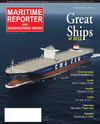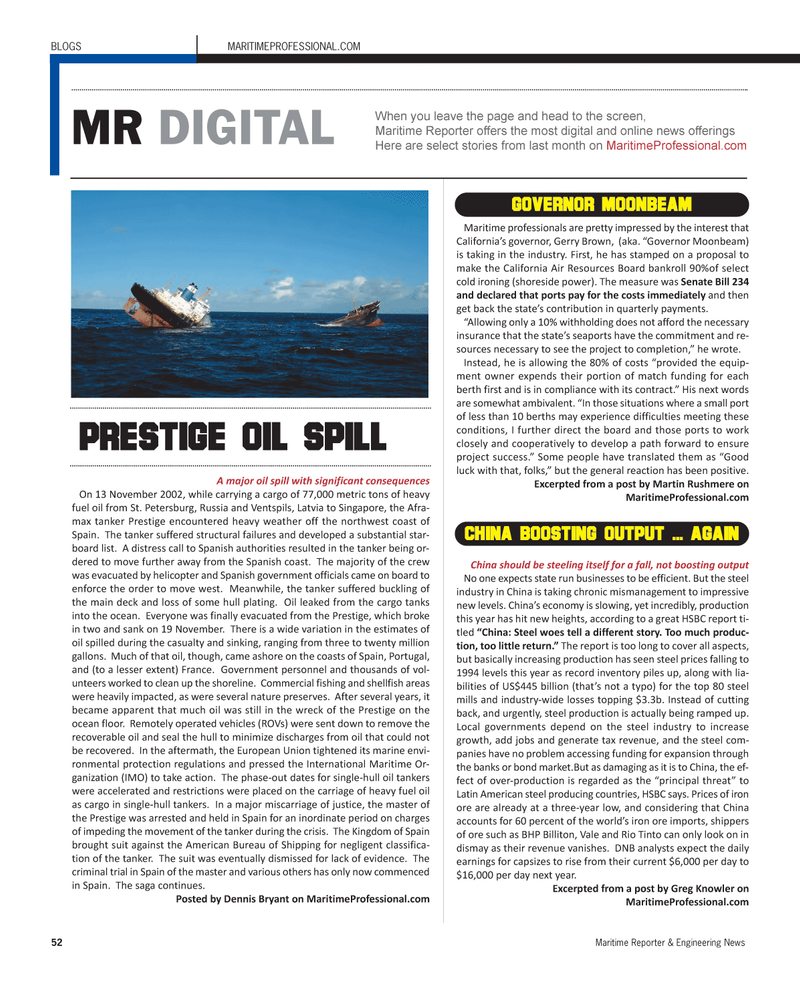
Page 52: of Maritime Reporter Magazine (December 2012)
Great Ships of 2012
Read this page in Pdf, Flash or Html5 edition of December 2012 Maritime Reporter Magazine
52Maritime Reporter & Engineering News BLOGSMARITIMEPROFESSIONAL.COMPrestige Oil SpillA major oil spill with significant consequences On 13 November 2002, while carrying a cargo of 77,000 metric tons of heavy fuel oil from St. Petersburg, Russia and Ventspils, Latvia to Singapore, the Afra- max tanker Prestige encountered heavy weather off the northwest coast of Spain. The tanker suffered structural failures and developed a substantial star- board list. A distress call to Spanish authorities resulted in the tanker being or- dered to move further away from the Spanish coast. The majority of the crew was evacuated by helicopter and Spanish government officials came on board to enforce the order to move west. Meanwhile, the tanker suffered buckling of the main deck and loss of some hull plating. Oil leaked from the cargo tanks into the ocean. Everyone was finally evacuated from the Prestige, which broke in two and sank on 19 November. There is a wide variation in the estimates of oil spilled during the casualty and sinking, ranging from three to twenty million gallons. Much of that oil, though, came ashore on the coasts of Spain, Portugal, and (to a lesser extent) France. Government personnel and thousands of vol- unteers worked to clean up the shoreline. Commercial fishing and shellfish areas were heavily impacted, as were several nature preserves. After several years, it became apparent that much oil was still in the wreck of the Prestige on the ocean floor. Remotely operated vehicles (ROVs) were sent down to remove the recoverable oil and seal the hull to minimize discharges from oil that could not be recovered. In the aftermath, the European Union tightened its marine envi- ronmental protection regulations and pressed the International Maritime Or- ganization (IMO) to take action. The phase-out dates for single-hull oil tankers were accelerated and restrictions were placed on the carriage of heavy fuel oil as cargo in single-hull tankers. In a major miscarriage of justice, the master of the Prestige was arrested and held in Spain for an inordinate period on charges of impeding the movement of the tanker during the crisis. The Kingdom of Spain brought suit against the American Bureau of Shipping for negligent classifica- tion of the tanker. The suit was eventually dismissed for lack of evidence. The criminal trial in Spain of the master and various others has only now commenced in Spain. The saga continues. Posted by Dennis Bryant on MaritimeProfessional.com MR DIGITAL When you leave the page and head to the screen, Maritime Reporter offers the most digital and online news offerings Here are select stories from last month on MaritimeProfessional.comMaritime professionals are pretty impressed by the interest that California?s governor, Gerry Brown, (aka. ?Governor Moonbeam) is taking in the industry. First, he has stamped on a proposal to make the California Air Resources Board bankroll 90%of select cold ironing (shoreside power). The measure was Senate Bill 234 and declared that ports pay for the costs immediately and thenget back the state?s contribution in quarterly payments. ?Allowing only a 10% withholding does not afford the necessary insurance that the state?s seaports have the commitment and re- sources necessary to see the project to completion,? he wrote. Instead, he is allowing the 80% of costs ?provided the equip- ment owner expends their portion of match funding for each berth first and is in compliance with its contract.? His next words are somewhat ambivalent. ?In those situations where a small port of less than 10 berths may experience difficulties meeting these conditions, I further direct the board and those ports to work closely and cooperatively to develop a path forward to ensure project success.? Some people have translated them as ?Good luck with that, folks,? but the general reaction has been positive. Excerpted from a post by Martin Rushmere on MaritimeProfessional.com China should be steeling itself for a fall, not boosting output No one expects state run businesses to be efficient. But the steel industry in China is taking chronic mismanagement to impressive new levels. China?s economy is slowing, yet incredibly, production this year has hit new heights, according to a great HSBC report ti- tled ?China: Steel woes tell a different story. Too much produc- tion, too little return.? The report is too long to cover all aspects, but basically increasing production has seen steel prices falling to 1994 levels this year as record inventory piles up, along with lia- bilities of US$445 billion (that?s not a typo) for the top 80 steel mills and industry-wide losses topping $3.3b. Instead of cutting back, and urgently, steel production is actually being ramped up. Local governments depend on the steel industry to increase growth, add jobs and generate tax revenue, and the steel com- panies have no problem accessing funding for expansion through the banks or bond market.But as damaging as it is to China, the ef- fect of over-production is regarded as the ?principal threat? to Latin American steel producing countries, HSBC says. Prices of iron ore are already at a three-year low, and considering that China accounts for 60 percent of the world?s iron ore imports, shippers of ore such as BHP Billiton, Vale and Rio Tinto can only look on in dismay as their revenue vanishes. DNB analysts expect the daily earnings for capsizes to rise from their current $6,000 per day to $16,000 per day next year. Excerpted from a post by Greg Knowler on MaritimeProfessional.com Governor MoonbeamChina Boosting output ... Again MR#12 (50-57):MR Template 12/4/2012 3:43 PM Page 52

 51
51

 53
53
